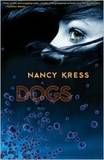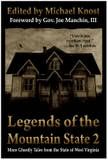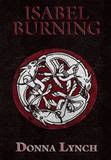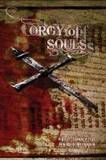Dogs / Nancy Kress
 Tachyon Publications / July 2008
Tachyon Publications / July 2008
Reviewed by: Michele Lee
Billed as part Cujo, part Andromeda Strain, Dogs is a modern-day science fiction/horror hybrid that couples America's love of dogs with biological terrorism. Told in straightforward, unadorned prose, Dogs follows, among others, Tessa, a woman who left the FBI after the death of her husband, due in part because her career had suffered from the bureau’s prejudice toward her husband’s Arab ethnicity. Tessa moves to Tyler, a small town outside of Washington D.C., with no clear idea on how to move on with her life after tragedy and disappointment.
The one impulsive move Tessa makes is getting a dog - a miniature poodle named Minette, whose mindless love seems to be the only good thing in Tessa's life. Her plans from there are vague and aimless, until a series of violent and deadly dog attacks - all within a small space of time - alert the town to the presence of a canine disease that will tear their world apart.
Thrust into the middle of a whole town of dogs suddenly turning on their owners, Tessa and down-to-earth good guy Jess, one of the town's few animal control officers, team up in the overwhelming task of rounding up all the dogs in Tyler. That is until Tessa begins receiving strange, threatening emails originally meant for her husband from a person who seems to know exactly where the plague came from. While Tessa embarks on a quest to clear her name, and the name of her dead husband, Jess has to fight newly-born militias (one determined to kill all the dogs, one determined to save the uninfected), multiple governmental agencies vying for control of the disaster, and the dogs themselves in a town gone mad.
Aside from being a multi-faceted story of the human love (or hate) for our canine companions, the most striking element at play here is that very few of the players know that they’re in the throes of bioterrorism. Most of the characters choose their paths - many of which will change their lives forever - based on wild guesses and fear. Readers get the feeling that they’re spying directly into the characters' lives and minds. Some are so ordinary that in the scope of the story they have only one moment of importance. With real world authenticity, some players never even realize their affect on the story unfolding around them because their motives are simple and pure, their actions mere side effects.
Dogs is a solid read and hard to put down. Despite the dark and gory potential of the situation, Kress doesn't delve fully into hardcore horror, preferring instead to present an idea, much like the idea of science gone wrong in Michael Crichton's genetic thriller Jurassic Park, and let the reader imagine the lasting depth of the terror for themselves.
Purchase Dogs by Nancy Kress.
Legends of the Mountain State 2: More Ghostly Tales from the State of West Virginia / Edited by Michael Knost
 Woodland Press, LLC / September 2008
Woodland Press, LLC / September 2008
Reviewed by: Vince A. Liaguno
The surprisingly rich depths of Mountain State folklore are again expertly mined by editor Michael Knost and thirteen dark scribes in Legends of the Mountain State 2: More Ghostly Tales from the State of West Virginia.
Its lengthy, schmaltzy title aside, Mark Justice’s “Dancing in Time to the Beating Heart of the World” is a surprisingly poignant story in which a heartbroken pharmacist’s faith is restored with the help of a haunted hospital’s ghost nurse and a curmudgeonly janitor. Justice imbues a genuine sense of emotion into this simple, classic-style ghost story that ably sets the tone of the anthology.
Jonathan Maberry’s delightful “The Adventure of the Greenbriar Ghost” expertly blends the unlikely elements of West Virginian folklore and English murder mystery. When the ghost of a young murdered country girl demands justice from the grave, the girl’s stalwart mother sends an imploring telegraph to famed Scotland Yard sleuth Sherlock Holmes, who’s visiting the new world with his faithful sidekick Dr. Watson on a matter of forgery. What follows is part police procedural, part period piece, part ghost story – all wrapped up in the delicious incongruence of proper English sensibility meets down-home Southern charm. A thoroughly engaging and enthralling cross-genre gem.
Bob Freeman’s “The Grim Beast of Iaeger” gamely employs the campfire story structure to tell a cautionary tale about a mythical beast that stalks a notorious section of the titular town known as Sandy Huff Hollow. Despite the oddly disconcerting old-time voice and vocabulary of the narrator that never quite rings true with the decidedly more modern details of the story, Freeman nevertheless manages to create a creepy vibe that floats along the thematic undercurrent of there being safety in numbers.
Lies and lineage take center stage in Lucy A. Snyder’s college campus-set “The Cold Gallery.” UC freshman Emma is embarking upon her first year of college and a new relationship with a long-absent father, a highly-regarded professor at the institution. But when her father arranges for a part-time job as the evening curator at the campus art gallery, ulterior motives become apparent and ghostly twists abound in this satisfying revenge tale.
The nightshift at the Harper’s Ferry police station proves as dangerous as the big city streets Nate Kenyon’s protagonist in “The Anniversary” left behind in this fog-enshrouded tale of an eerie ghost train. Kenyon does an admirable job capturing the innate spookiness of third shift work, with a grand old twist at the end guaranteed to raise some gooseflesh.
In Steven L. Shrewsbury’s “Cain Twists”, an Indian psychometrist is called to the site where the bones of a half dozen infants have been unearthed by the dubious son of a colleague. Although the political commentary – American Indians and abortion - is heavy-handed at times and the story ends rather abruptly, Shrewsbury shows a notable talent for creating creepy imagery, with vengeful ghost babies and an inconveniently placed gardening implement lending the story its visceral edge.
In the forests surrounding Flatwoods, a Braxton County sheriff runs afoul of otherworldly horrors while on the hunt for two missing boys in Michael Laimo’s wildly inventive “Occurrence at Flatwoods.” Laimo’s considerable descriptive powers are on full display here, drawing the reader deeper into the legend of The Flatwoods Monster. One of the collection’s honorable mentions.
“Buyer beware” is the cautionary theme of Maurice Broaddus’ sublime “A House is Not a Home” – the standout of the collection. When a young artsy couple goes house hunting, they find more than they bargained for as an appealing fixer-upper soon becomes a conduit back through time. Soon the couple finds themselves part of living history as they find more than termites in a basement that once served as a stop on the Underground Railroad. Broaddus’ commanding use of language coats the story with a lushness that belies its short fiction format and places it in a class of its own.
Gary A. Braunbeck shares some “Dark Wisdom” in a spooky little tale of poetic justice, the limits of love between fathers and sons, and some ghostly prison inmates. Braunbeck shows admirable restraint in what could have otherwise been a heavy-handed morality tale in the hands of a lesser writer.
Brian J. Hatcher opts to tug heartstrings instead of stopping hearts in the affecting “An Angel in the Balcony,” in which an actress overcomes her opening night jitters with some help from one of the theater’s two resident ghosts. Although the subtlest of the bunch, Hatcher’s tale stands out for its tender climax – at times sweet, but never too saccharine.
In “Andi,” Mary SanGiovanni takes on another haunted healthcare setting in this story of guilt and grief and a haunted sanitarium. Like Justice’s “Dancing in Time,” SanGiovanni’s well-paced tale speaks to the resiliency of the human spirit when lent a hand from the other side. SanGiovanni’s writing chops are in fine form here, as in this passage where she attempts to define the abstract:
"There are places all over the earth where the air is different. Andi might have said those places were soaked through with magic, with death, with that which bleeds into this world from the other side. It gets into the ground, the clothes, the hair, the fabric of everyday life, a thick smoke, a cloying sensation of otherness, of being watched, of being waited for."
Wounded Civil War soldiers haunt a residential neighborhood in Rob Darnell’s “The Man in Ragged Blue.” The story – the weakest of the collection – lacks punch and feels wooden at times. Although the legend behind the tale is ripe with possibility, it never feels fully explored here as a newcomer to the town of Parkersburg tries to stop nightly visits from the wounded specter of a Civil War soldier – who seems to need only a few inexplicable shots of whiskey to finally find his eternal rest in the story’s confounding ending.
A beautiful homecoming queen’s annual ghostly walk across a football field dovetails with the imminent passing of a terminally-ill man in Nate Southard’s moving “For Just One Night.” More a nuanced portrait of sibling devotion than full-fledged ghost story, Southard explores the idea of the immediacy of connecting to spiritual comfort in the midst of great human suffering with this gentle, bittersweet story.
As a collection, the thirteen stories in Legends of the Mountain State 2: More Ghostly Tales from the State of West Virginia work cohesively to paint a multi-layered portrait of a working-class region overflowing with superstition and ghostly lore. As in the first volume, editor Knost does a commendable job balancing the terror and tenderness. Individually, some of the stories feel restrained by an arbitrary word count, like butterflies whose wings can’t fully spread because of the constraints of their cocoons. Longer stories like Maberry’s “The Adventure of the Greenbriar Ghost” show that others – like the Kenyon and Shrewsbury pieces - would have benefitted from an expanded treatment.
While Maberry gets the ingenuity award for most original use of a Mountain State legend, the real props here go to Broaddus and SanGiovanni – Snyder, too, albeit to a lesser degree - who expertly recount their chosen legends by fully weaving them into the narrative fabric of their tales, without someone telling an actual story within their stories.
This fall, take a trip into the shadowy mountains of folkloric West Virginia with this at times engaging, on occasion brilliant, but always enjoyable collection of regional urban legends.
Purchase link coming soon.
Earthworm Gods: Selected Scenes from the End of the World / Brian Keene
 Delirium Books / May 2008
Delirium Books / May 2008
Reviewed by: Jeff Burk
Last year Brian Keene and Delirium Books released a collection of thirty-two short stories taking place in the zombie-world of The Rising. This summer Keene and Delirium present a short story collection in the Earthworm Gods (or The Conqueror Worms, as re-titled for the Leisure release) universe. Before we go any further, it is essential that you have read the core novel to fully enjoy this collection.
The stories start with the first drops of rain and end far after the end of the human-dominant world. The first third of the book deals with the flooding of the world and reads more like a disaster-thriller than a horror story. Once the worms first appear, the book is a full-on monster-fest until the final page. Mermaids, mold-zombies, sea-monsters and lots of giant worms plague the (un)lucky survivors who populate these tales.
As with many of his stories, Keene references much of his other work (now referred to as "the Labyrinth"). Since each story was based on a real-life person who purchased the deluxe edition (limited to thirty-two) of this book, there is some character cross-over with The Rising: Selected Scenes from the End of the World which was written in the same manner. It’s comforting to know that many survivors of the Apocalypse will be bibliophiles.
Keene has proven time and again that he is a master of the novel format, less so with short fiction. His shorter works tend to either suffer from repetition (The Rising: Selected Scenes from the End of the World) or dullness (most of Fear of Gravity). Here, thankfully, the stories suffer from neither. Keene takes full advantage of the varied and numerous threats present, so the reader never knows what to expect from the next story.
If you enjoyed Earthworm Gods/The Conqueror Worms at all, you owe it to yourself to pick up this collection. This very well may be the best collection of Keene's short stories in print. Delirium has announced that due to the current economic climate there will be no paperback version in the foreseeable future, leaving a few hardbacks (limited to 500 signed and numbered) available through some internet sites. Our advice: Get out there and snag a copy of this while you still can.
Purchase Earthworm Gods: Selected Scenes from the End of the World by Brian Keene.
Purchase The Conqueror Worms by Brian Keene.
Isabel Burning / Donna Lynch
 Raw Dog Screaming Press / August 2008
Raw Dog Screaming Press / August 2008
Reviewed by: Martel Sardina
Isabel Burning was not originally intended to be a novel. Author Donna Lynch, a singer/songwriter for the band Ego Likeness, had not delved into novel writing before, preferring to pen more poetry than prose. She doesn’t quite recall the sequence of events that led to the idea’s evolution, which eventually grew to include several songs on the album “Water to the Dead” and the novel, Isabel Burning. But she’ll proudly lay her claim to the final products born out of two very different types of media.
Isabel, Lynch’s protagonist, is a young English woman who is generally dissatisfied with life. She yearns to do something important, to be part of something bigger than the mediocrity she was born into, to leave her mark on the world. These longings lead her to take a job as a housekeeper for the Grace Mansion. The desire to perform domestic duties is not the reason she takes the job. Her new employer, Dr. Edward Grace, is an eccentric scientist who claims to have found a method to quantify the existence of the human soul. Isabel is fascinated by the man and his work and wants to help him in his quest.
It becomes clear that Dr. Grace has more than a professional interest in Isabel, despite being old enough to be her father. The two become lovers. As Isabel falls in love with him, she wants to know more; however, Dr. Grace is full of secrets and wants nothing revealed. Instead, he distracts Isabel with the experiment, convincing her to sacrifice her own body for the sake of the research. Grace is giving Isabel the opportunity to give her life meaning and purpose.
As the experiment continues, Isabel learns that Grace is addicted to morphine. Her participation also leads to using the drug. Isabel begins to have doubts about the validity of Grace’s theories. Could she just be subjecting herself to the crazed ideas of a madman? She doubts his vision until the night when the first round of testing is completed and she experiences things for herself that Grace has claimed to see.
This round of testing results in a shared consciousness. They have the ability to hear each other’s thoughts, although Isabel’s skill at filtering them out is not as good as Edward’s. He is still able to guard his secrets from her. Undaunted, Isabel desperately searches for the truth and stops at nothing to find it.
Lynch’s style of writing is decidedly more literary. The story is told at a rather slower pace than this reviewer is used to. Much time is spent on Isabel’s observations and feeling about events as they unfold, as opposed to a more action-oriented plot. Once the concept of the shared consciousness is introduced, there seems to be some inconsistency in how it is applied. At times, Isabel worries about Grace’s ability to hear her thoughts; other times, she takes action without regard for what Grace might do in response. Overall, the concept of quantifying the existence of the soul and the methods for doing so are interesting. Lynch’s ability to layer the story by sharing Dr. Grace’s experiences in Africa added additional elements that set the tale apart from others like it.
And for those who enjoy Isabel Burning, word on the street is that Lynch has plans to follow up with more tales of the Grace family in the future.
Purchase Isabel Burning by Donna Lynch.
Orgy of Souls / Wrath James White and Maurice Broaddus
 Apex Publications / June 2008
Apex Publications / June 2008
Reviewed by: Jeff Burk
Orgy of Souls is one of the most intriguing author pairings in recent history. Maurice Broaddus is a real-life minister who happens to write horror fiction. Wrath James White is an atheist and professional fighter who also happens to write horror fiction. Together, they have written a novel of extreme horror that examines faith and the age-old-question of "why do bad things happen to good people?"
The story concerns Samuel, a priest who contracted HIV during a blood transfusion. His body is wasting away and his faith is wavering. Meanwhile, his brother Samson, a hard-partying male model, has devised a plan to save Samuel's life. Samson has studied magic and contacted a supernatural entity to make a deal – twenty souls for the life of Samuel.
The plot is based on a very interesting concept but takes some time to get going. The book is very short – clocking in at a slim 140 pages - and it takes almost half that to get to the horror. Once things get violent though, the story is an exciting ride until the very end. Sex, drugs, gore, demons, and even a giant monster all await the patient reader.
Both authors compliment each other nicely. At no point can the reader tell when one's contribution ends and the other's begins. Each writer also gets his chance to profess his spiritual beliefs through the characters. Samuel speaks for Broaddus and espouses the positive aspects of faith. Samson points out the hypocrisy and irrationality of religion in keeping with White’s atheism. The plot allows for many opportunities for the authors to explain their philosophies and it works well in most scenes, but there are points in which the story gets derailed for the sake of preaching to the audience a bit.
Wrath James White and Maurice Broaddus have created a fun and exciting story. While Orgy of Souls could have used some tightening plot-wise, it is still a strong story. Fans of both authors should be satisfied, but if you are new to White or Broaddus, another book would be a better introduction. Enthusiasts of religious and/or hardcore horror should take note. Not enough stories manage to combine extreme violence with philosophical discourse.
Purchase Orgy of Souls by Wrath James White and Maurice Broaddus.
Snuff / Chuck Palahniuk
 Doubleday / May 2008
Doubleday / May 2008
Reviewed by: Jeff Burk
Chuck Palahniuk made a name for himself writing pitch-black social satires (Fight Club, Survivor) and has, in recent years, expanded into the realm of horror (Haunted, Lullaby). His most recent novel, Snuff, is about the filming of a world-record-breaking gang-bang porn film, in which actress Cassie Wright will have sex, on-screen, with six-hundred men. With a title and plot like that, what horror fan would not be intrigued?
The story is told from four alternating first-person perspectives. Mr. 72 is a twenty-year old virgin who believes Cassie is his mother. Mr. 137 is looking to restart his TV career. Mr. 600 is an old friend of Cassie's and there to help. Completing the cast of characters is Sheila, the young events coordinator. In past works, Palahniuk has been criticized for giving all of his characters the same personality and writing them with the same voice. Nowhere in his bibliography is that weakness more apparent than in Snuff. All these characters, despite their dramatically different motivations and backgrounds, sound alike.
Almost every character Palahniuk has ever created has had the personality quirk of obsessively listing facts and trivia. This Palahniukism (if it's not already a word, it should be) is never more annoying than here. In his early novels, this trait forwarded the plot and provided character insight. In Snuff, its only purpose is to take up pages, with about of third of the book being filler. How many plot summaries of made-up porn films do we really need to read? Palahniuk seems to believe several dozen.
These weaknesses in character would be tolerable if he managed to deliver on any of the potential promise of the plot. Unfortunately, the book never really goes anywhere past the first few chapters of set-up. The characters spend most of the book standing around waiting for their turn at a little action, and the story does the same. When the final chapter finally arrives, and something finally happens, it’s over far too quickly, the literary equivalent of a premature ejaculation.
Chuck Palahniuk burst onto the literary scene with several novels that were shocking in their believable brutality. With each book he writes, the plots become darker yet they shock the reader less. Snuff is presents an exceptionally interesting and potentially disturbing idea, but Palahniuk fails to deliver. This could have been a great story, but as it stands, Snuff is frustratingly soft-core with no real money-shots.
Purchase Snuff by Chuck Palahniuk.
Me2 / M. Christian
 Alyson Books / March 2008
Alyson Books / March 2008
Reviewed by: Vince A. Liaguno
What would you do if you discovered another you – a dead-ringer who shows up at your job, moves into your apartment, and steals your friends? In Me2, M. Christian offers up a unique – if at times wearisome - look at individual identity and societal conformity and the dangerous intersection at which both meet.
More experimental novel than straightforward storytelling, Me2 presents an unnamed narrator who’s convinced that he’s been somehow replicated. While each chapter is introduced by one side of a different conversation that attempts to offer possible explanations – evil twin, lost sibling, robot, alien, doppelganger, clone – the narrative is essentially held together by the loose, stream-of-consciousness point-of-view of this nameless narrator. There’s less a sequence of events resembling a plot than a sequence of mental meanderings meant to explain the narrator’s predicament – of which we’re never quite sure to begin with.
Paranoid manifestations of schizophrenia? Cautionary parable about conformism? Overwrought metaphor for the affects of consumerism on individual indentity? Who knows – and who really cares? Christian’s narrator is so bland, faceless, and devoid of anything resembling human emotion – other than a generic, paranoid fear – that it’s hard to connect with either the character or what little story there is here. Even the little sex that’s offered up is antiseptic. While it’s clear – and necessary, to a point - that the author intentionally coats the proceedings with a nonspecific layer of colorless paint in order to speak to the idea of the dulling down of individuality, it nevertheless fails to fuel or hold interest.
That said, Me2 is not without its merits. Christian possesses one of the most unique voices in fiction, using alliteration and repetition to create a poetry/prose hybrid form of writing that – despite the lackluster plot – draws the reader in. To discover Christian’s subtle undercurrent of staccato literary rhythm is like discovering a series of intricate, exploration-worthy catacombs beneath the most conventional suburban house on the most generic of cul de sacs.
Decidedly more high-brow concept novel than horror tale, Me2 would have been better marketed as literary fiction. While there are some keenly astute observations about the emulsification of queer identity and its absorption into mainstream culture, its distinct avant-garde approach to horror will be disconcerting to the average genre reader. More artsy East Village than working-class Brooklyn, Me2 is a hallucinogenic, thought-provoking work of modernism likely to evoke more Euripides than heebie-jeebies. Read it for the writing; skip it for the horror.
Purchase Me2 by M. Christian.




